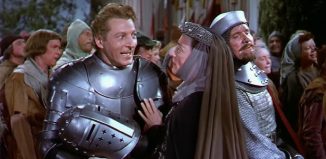The mythology of real and imagined heroes
Modern mythology, as it was for those Greeks and Romans long ago, is a carnival mirror. Mythology helps us see ourselves and our world using distortions to exaggerate truths or to give us a chance to focus on different parts of our lives and society.
The Greeks created these spectacular stories to understand how the sun crossed the sky to where spiders came from. The former occurred because Apollo pulled a chariot across the sky and the latter was a result of a mortal woman named Arachne engaging in a weaving contest with the goddess Athena.
For the Greeks, these stories offered a possible cause for the inexplicable and helped ordinary people cope with the seemingly arbitrary and capricious nature of events around them. Why, they might wonder, did their favorite tree die when lightning struck it? Zeus must have been upset about the latest offering or about the words you said when you were at the market. A chest of gold washed ashore near you? You must have done something to please Poseidon.
Our modern myths and heroes come from many places. People win Purple Heart decorations from grateful presidents, earn medals of honor for their valor, or walk or run hundreds of miles to raise money for worthy causes. The list, of course, is much longer than that: Scientists and doctors fight to find cures for cancer, autism, heart disease, Alzheimer’s disease and many other problems; firefighters race into burning buildings to save others; and police officers protect and serve our communities.
Hollywood wants a piece of the hero action, pumping out movies about people with the everyday courage to challenge conventional thinking. The studios have invested considerable money in the live action version of comic book characters, cranking out stories about men and women with spectacular powers, incredible toys and spirited enemies.
In a new twist, Batman and Superman will battle it out around the same time that Captain America and Iron Man clash. Is it a coincidence that these movies are coming out at around the same time? Maybe. Is it a coincidence that they’re coming out at the same time that Trump and Hillary get ready for the main event? Maybe not.
In any case, these movies, which hope to capture plenty of dollars, have seized on something visible in our carnival mirror. People, like their on-screen superheroes, want to do the right thing — whatever that may be. At the same time, others, driven by a similar desire, may pull in the opposite direction. A conflict is inevitable, particularly in the context of a modern world in which quick reflexes are more important than reason and consideration.
We don’t sleep on decisions anymore or consider our moves or the consequences. With people plugged in wherever they are, the world requires instant responses. Strength comes from thoughts that travel at the speed of Zeus’ lightning bolt.
Like the Greek gods who fought with each other, our modern movie heroes are no better than the rest of us. They are limited by their perspectives, weaknesses and a past that threatens to push them in the same decision-making rut.
What does the carnival mirror, at least the one that Hollywood is using, suggest about where we’re heading in a country divided between red and blue states, between us and them? I don’t know how these new movies end, but I suspect these superheroes learned to stop fighting and work together.
Hopefully, the Republicans and Democrats, who stand in front of the same flag and ask God to bless America, will figure out a way to reach across the aisle and create the kind of peace, security and prosperity we would all like to experience. Wouldn’t that be a nice Hollywood ending?






